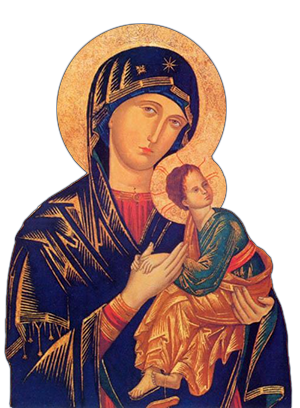Father Mitch Pacwa's homily for December 14th, 2020
Today’s Gospel brings up a problem that occurs throughout humanity–and we certainly see it in our own time; there are people who want to have authority and power but disregard what is true for its own sake. In this case, the chief priests and the elders were in charge of the temple where Our Lord was teaching, in the last days before his crucifixion. This is soon after Palm Sunday. And throughout the Gospel, he had been teaching with authority, and not like the Scribes and Pharisees. Remember that line?
What was the difference from the beginning? He would simply say various teachings. The Sermon on the Mount does not say, “well, as rabbi so and so said, but then rabbi so and so said this.” No, He does not do that. That is not an unusual kind of discourse that occurred. He simply said the various truths of the Sermon on the Mount, and spoke on His own authority. This obviously continued all the way to this point. He is teaching on His own authority; in the authority given to him by His heavenly father.
In John’s Gospel, we see frequently, Our Lord says, I am simply saying what the Father gave me to say. But they are not ready to hear that. Because their concern is with how their words–and in this case the chief priests and the elders, in discussing the origin of John’s baptism–are more concerned, and solely concerned about what other people will say. They try to anticipate Jesus criticizing them. “Why did you not believe?” They certainly anticipate the crowd and what they would say. They did not have polls yet. But they knew enough of the folks that they did not need a poll to find out what people thought. They had heard and listened.
And this is what we certainly see going on among many politicians. They will follow the polling groups, and interest groups, and such, and act, not because they are committed to something because it is true in and of itself.
In fact, in a society such as ours, where being concerned about the truth is actually denigrated in the face of a certain kind of relativism saying, “there is no truth; it is just how I feel about these things.” Or, “it is my truth,” and so on. And people won’t give an answer to which they are committed, and as a result, they also will wave with the popularity of one thing or another, instead of having clear principles by which they discern.
What Our Lord says in response to them and their own going back and forth is, “then neither shall I tell you by what authority I do these things.” They are incapable of accepting what he says. It’s not that they simply will not like it, that would be true, but they are incapable of accepting truth because they have no concern for truth.
Our own role as Christians is to be committed to the truth that is personified by Jesus Christ Himself. Truth is not merely some abstract principle. Truth is a person. Our Lord identifies Himself as our truth. And with that person also comes many principles that are true. There are many true statements and many true principles, and this is what the Gospel is about. In our commitment to that, various people–I was just hearing how some of the politicians want to see the Catholic bishops as a lobbyist group because they want to protect the right to life. They are seen as just another political force. People committed to the truth have to be put into a category that fits their world of the inability to tell the truth. It’s a good example of the inability to love what is true for its own sake, because they just perceive the world through power moves, rather than through commitment to the truths of our faith and our morals.
It is not only the politicians. There are plenty of people inside the Church who try to imitate them, and have little commitment to what is true for its own sake. I don’t just want to put on politicians; it’s just that the news is more concerned with them, in general, so it is easier to spot that. And it is because our media, with 24 hour news and everything, so fills our culture with these relativistic attitudes to truth–“I have my truth and you have yours”–for the sake of acquiring power by which I can control you and win. It is necessary to be able to use violence to ensure that you comply not because I have a principle. As a matter of fact, we see in these principles, that they switch back and forth frequently enough. No, it is because I said so. And we see that enough.
It is obviously a strong temptation in our society to cave in and say, to be like these chief priests and elders, who will not say what they think, either because it does not matter, or they simply want control, or because–and this is also very true in today’s world–too many people do not know how to defend their own principles; they do not know how to explain it. They do not think logically. Even we see this in the universities, that they say that logic is a western European imposition on the world, and a masculine, patriarchal, paternalistic…all sorts of things. They make up that stuff in order to avoid thinking logically, and see the principles of truth, and then make a commitment to what is true because it is true.
So in the face of that, a lot of our young people are told to disregard logic, whereas, one of the points that Aristotle brings out in his logic, is that logic is rooted in the structure of the sentence. Every single culture that has language, which is all human societies, every language has a logic within it. There is good grammar and bad grammar. That is also, by the way, why you see, in some of the schools, down to the elementary school level, attacks on good grammar, because when you talk about grammar, you necessarily talk about logic, and they do not want that. They do not want what would force people to think about what is true and what is false. If they do not want it on something as basic as the structure of the sentence and the meaning of words, how can we expect such people to be committed to principles that are of a higher order? Whether in the secular level, of the Constitution, or for us, more importantly, the Gospel.
This is what underlies today’s Gospel. And it is something that we ourselves very much have to have clear in our minds: that, because we are committed to the person of Jesus Christ. We are committed to truth because it is true, not for what I get out of it–although there is great benefit in what is true–and that I have to make hard decisions to hold to the practice of our faith in tough ways.
Today, as I mentioned we celebrate St. John of the Cross. It is an interesting situation for him, where he also had to be committed to a certain number of truths and be willing, and he did, suffer for those truths. First of all, he came from a very, very poor background. His father had been doing well, working for the family, but, because he fell in love and married a woman of a lower class, the rest of the family kicked him out. And the father died early, and his brother died because they were so hungry and poor. He had to go to a free school to learn Catechism. But then, because he was so bright and he was chosen to be an altar server for a convent, he was eventually given admission to a Jesuit high school and he got an education. In those days, the local nobleman paid for the school to operate and the students came for free. So he studied with the Jesuits and then went on to join the Carmelites. But after he was ordained, he wanted maybe a Carthusian life; that would be even more strict.
For him, the truth of knowing Christ was of great depth, and he wanted to follow that depth, but on the way to that process of becoming a Carthusian, he met St. Teresa of Avila, who was founding her second convent of the reform of the Carmelites.
During the bubonic plague period, the strict rules of the Carmelites had been eased-off. They could eat meat and more food and a variety of other things happened because people were dying.
Remember, we have a plague and it is very difficult. So, sadly, a couple of hundred thousand people have died early because of it. But their plague had somewhere–we do not know the exact figures, but it is between one third and one half of all of Europe died. Imagine. Imagine that. That would be for us, somewhere between 100 and 150 million people dying (in proportion to our population). Could you imagine what that would be like? So they eased up the rules. And they didn’t go back after the plague was done.
And St. Teresa of Avila had lived a very frivolous life herself. She looked at her own life and she was a very silly person, she thought, and very vain. Until she felt Our Lord calling her to more deep relationship and that flame not only caught hold of her, and the principles of living the original order’s rules, it caught hold of her, and she passed that on to St. John the Cross, who cooperated with her in founding communities of men, like St. John, and in helping the women with very strict rules of prayer and abnegation.
He also wrote deep books about his spiritual experience. And for that, the order–the main order–said, you have to stop this reform and they put him under arrest and scourged him, daily, in front of everybody. He suffered quite a bit. But he would not and could not stop. He was committed to the principles of the reform. He eventually was able to unhinge the door of his jail and escaped through the next cell that had a window. So he was a jail breaker. And he went on to continue the holiness of his order. And in his own life, writing some of the greatest poetry in the Spanish language, but poetry that was oriented toward the depth of the spiritual life. That kind of commitment to what was true about Christ helped him to endure that. And not being bitter. Not whining. But to do what Christ asked of him because it was good and because it was true.
This is what Our Lord asks of us as well: to make that commitment and to be firm in what is true. Not to go by what others may think, or to do it on the basis of polls. But as citizens, and more importantly as citizens of heaven, we commit ourselves to these principles, so that one day Our Lord might say to us, “well done, good and faithful servant,” as He did to St. John of the Cross, who not only became very holy, but a doctor, that is, a teacher of the Church.
Transcript provided by WQPH



